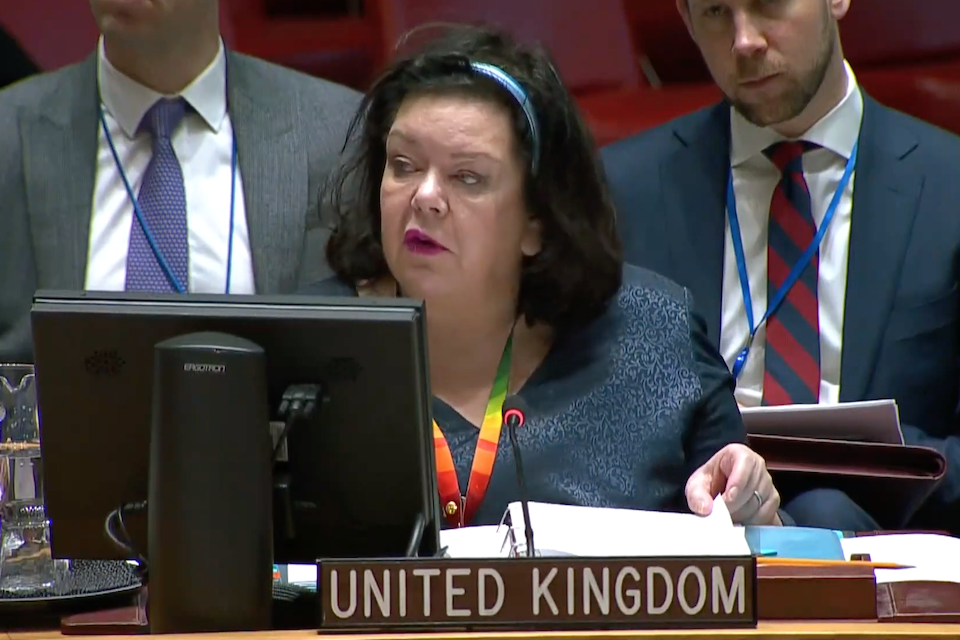Transitional justice in conflict and post-conflict situations
Statement by Ambassador Karen Pierce, UK Permanent Representative to the UN, at the Security Council open debate on peace-building and sustaining peace.

Thank you very much, Mr President, and may I join others in thanking Belgium for the convening this important debate. Very pleased, High Commissioner, that you were able to join us and brief the Security Council, and may there are many more occasions where that might happen. And thank you also to our other two briefers.
Mr President, I’ll make three short points.
Firstly, I want briefly to state the reasons that the UK considers accountability for conflict-related crimes so important for peace and security.
Second, I want to acknowledge some of the important developments in transitional justice policy and practice over the last few decades and their relevance beyond the traditionally understood “transition cycle.”
And thirdly, I want to propose that for transitional justice to be more meaningful for sustaining peace, we need to find better ways, and means of connecting it with social, or socio-economic, justice.
Mr President, on my first point, the United Kingdom believes that legal accountability for conflict-related crimes serves as deterrent, punishment, and a method for upholding victims’ rights. Without it, there can be neither reconciliation of communities, nor faith in the functioning of rule of law institutions, nor respect for the rules-based international system.
These are the principles for which my government stands. There should be no impunity for international crimes, no amnesty for gross violations. As a spokesman for the Sudanese government put it on Tuesday, “justice cannot be achieved if we don’t heal the wounds.” And I want to welcome the Government of Sudan’s decision to hold former President Omar al-Bashir and others accountable, which would be a significant step towards a peace settlement in Darfur.
Victims of human rights violations in Myanmar also deserve justice. It is difficult to see how Rohingya refugees in Bangladesh can return to Rakhine State unless they are confident that the perpetrators – in particular, the Burmese military – will be held accountable.
Mr President, on my second point, transitional justice began as an innovative way of enabling justice in post-conflict environments. Over the past 25 years, there have been significant developments in this field and many of the representatives around the table – particularly South Africa and Tunisia – have set out some of these developments in their countries, which was very interesting.
Mechanisms and processes have been increasingly inclusive and nationally owned. The consultative, inclusive and independent manner in which the Gambia established its Truth, Reconciliation and Reparations Commission has shown the benefits of national ownership to secure public confidence.
I also want to welcome the recent verdict by Bangui Court of Appeal in the Central African Republic, holding accountable 28 individuals for war crimes and crimes against humanity related to the killing of 75 civilians and 10 United Nations peacekeepers in the Bangassou area.
Transitional justice processes have assumed an increasingly victim-centered approach. More and more, efforts have been situated in broader institutional reform, including security sector reform. In Afghanistan, transitional justice initiatives have demonstrated what can be achieved in terms of local level reconciliation, even prior to the signature of a comprehensive peace agreement.
This breadth of application across such a range of issues has taught us that transitional justice has relevance far beyond the “transition cycle” traditionally associated with countries emerging from conflict. It can make inroads even amidst ongoing hostilities, and its toolkit can serve states and communities long after a conflict ends.
Notwithstanding these developments, Mr President, the time has come to have a critical conversation about what transitional justice has achieved in terms of building a peace that is sustainable and what more can be done. The root causes of conflict are persistent, and their manifestations are as adaptable as they are pernicious.
This brings me to my final point, Mr President. We now possess evidence that unless there is a proper response to deal with wider social and economic injustices, the root causes of conflict are highly capable of morphing into other forms of violence and discrimination further down the line.
Not only does this risk the achievements of transitional justice being reduced to little more than lip service in the eyes of those affected by conflict, as they continue to experience a wide array of injustices in their daily lives, it presents a real risk of further cycles of conflict and insecurity.
As transitional justice policy and practice continue to evolve, we should start to forge closer links with broader challenges to peace, justice and inclusion. Truth and Reconciliation Commissions in Kenya and Tunisia have shown impressive results in the space, demonstrating that transitional justice mechanisms and mandates are well-positioned to make an increasing contribution to addressing the root causes of conflict.
Thank you.